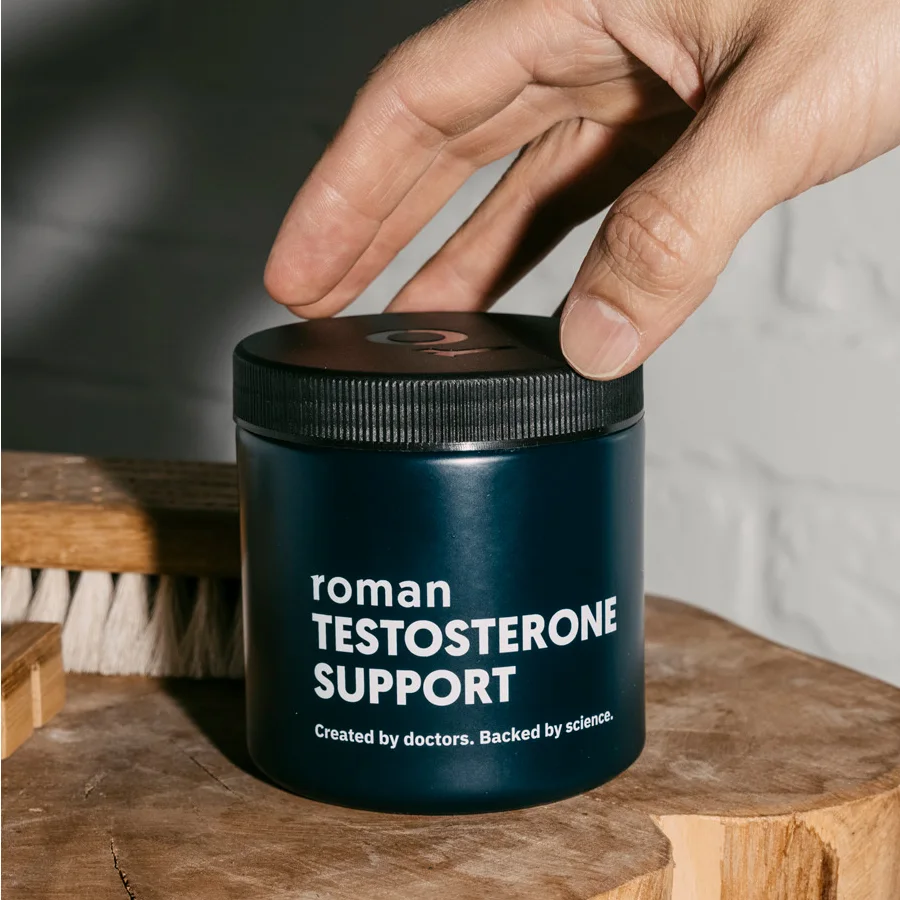Here's what we'll cover
Here's what we'll cover
More is not necessarily better when it comes to testosterone. Healthy testosterone levels positively affect muscle size, sex drive, and more. But past a certain point, consistently high testosterone can cause problems. Signs of high testosterone in men include acne, hair loss, mood swings, and trouble sleeping.
Read on to learn about the signs of high testosterone in men.
What is testosterone?
Testosterone is a male sex hormone (also called an androgen) that both men and women have.
In men, testosterone production occurs mainly in the testicles and helps your body build and maintain muscle mass, maintain a healthy libido, and stabilize your energy levels (Nassar, 2022).
Even before adulthood, people need testosterone to grow and mature. Low testosterone can delay puberty or hinder normal development in men (Nassar, 2022).
Testosterone is essential for overall health and wellness. It may help increase insulin sensitivity and, thanks to its ability to decrease fat mass, may prevent the progression from prediabetes to diabetes. Testosterone also helps the body build lean muscle (Dandona, 2020).
Normal testosterone levels in men
There are two types of testosterone: free testosterone and protein-bound testosterone. Together, these make up your total testosterone. A "normal” reading of total testosterone levels falls anywhere between 300 and 1000 nanograms per deciliter (ng/dL), depending on what lab processes your sample or who you ask. When it comes to defining “abnormal” testosterone levels, meaning levels that are too low or too high, it’s important to remember that the cutoffs for testosterone are not as well-defined as other blood values, like hemoglobin levels.
For example, according to the American Urological Association (AUA), having a value below 300 ng/dL is a “reasonable cut-off” to be diagnosed with low testosterone, which can trigger treatment (Mulhall, 2018). But healthcare providers might still treat someone with slightly higher T levels if the signs and symptoms are typical of low T.
Low testosterone (hypogonadism)—which may be caused by aging, trauma, genetic conditions like Klinefelter syndrome, and more—may cause low libido, low sperm count and infertility, erectile dysfunction, weight gain, or a loss of pubic or armpit hair (Sizar, 2021).
Similarly, testosterone that’s higher than “normal” has its own set of causes and symptoms. Let’s take a look at what causes testosterone levels to spike.
What causes high testosterone in men?
High levels of testosterone don’t usually happen naturally. Men with too much testosterone may have high levels due to (Nassar, 2022; Ganesan, 2021):
Using anabolic steroids (inappropriately or illegally)
Exposure to testosterone gel
Adrenal or testicular tumors
Signs of high testosterone in men
While higher-than-normal testosterone levels are not very common in men, if your levels do spike and stay high for a while, you may experience signs of high testosterone like acne, hair loss, mood swings, and trouble sleeping.
Acne
Testosterone can increase sebum production (an oily substance found on the skin), which may lead to clogged pores and acne. As such, men with high testosterone may experience more acne than those with normal levels (Sutaria, 2022).
Hair loss
Some people with high testosterone experience androgenetic alopecia or male pattern hair loss (also called male pattern baldness) (Filatova, 2021).
In people with a genetic predisposition to male pattern baldness, high testosterone may also cause hair loss (Kische, 2017).
Mood swings
Elevated testosterone levels may contribute to mood disorders like irritability and aggressiveness. They may also make you more prone to take risks, especially if the cause of your high T is anabolic steroid abuse (Johnson, 2013).
Sleep problems
High testosterone may cause restlessness and difficulty falling or staying asleep. Researchers aren’t sure how testosterone affects sleep, but they believe it may affect your circadian rhythm. Some providers even use testosterone therapy as a treatment for sleep apnea, but the results are inconclusive (Wittert, 2014).
How to treat high testosterone in men
High testosterone is treated differently depending on the cause. If you experience signs of high testosterone, your healthcare provider may run a simple blood test to measure your testosterone levels. An appropriate treatment plan will depend on the cause of your high T.
Here are some ways to treat high testosterone:
Adjust testosterone replacement therapy (TRT)
If you receive testosterone replacement therapy (TRT) for low testosterone levels and your hormone levels get too high, your healthcare provider will work with you to adjust your dosage and get your blood levels within a normal range.
Decrease or stop anabolic steroids
If you use anabolic steroids for muscle gains and your T levels spike, you might experience signs of high testosterone. If you’re using anabolic steroids illegally and without the supervision of your healthcare provider, it’s a good idea to let your healthcare provider know since they come with risks and potential side effects. Long-term health problems include severe medical conditions like heart disease, kidney problems, liver disease, and blood clots, potentially leading to heart attacks and strokes (AlShareef, 2022).
Treat underlying conditions
If a testicular tumor is producing testosterone or otherwise affecting your hormone levels, treating it may bring your testosterone levels back into the normal range.
If you experience any signs of high testosterone, visit your healthcare provider. They can work with you to determine why your testosterone levels are high and make a treatment plan to bring them back to the normal range.
DISCLAIMER
If you have any medical questions or concerns, please talk to your healthcare provider. The articles on Health Guide are underpinned by peer-reviewed research and information drawn from medical societies and governmental agencies. However, they are not a substitute for professional medical advice, diagnosis, or treatment.
AlShareef, S., Gokarakonda, S. B., & Marwaha, R. (2022). Anabolic steroid use disorder. StatPearls. Retrieved on Jun. 14, 2022 from https://www.ncbi.nlm.nih.gov/books/NBK538174/
Dandona, P., Dhindsa, S., Ghanim, H., et al. (2020). Mechanisms underlying the metabolic actions of testosterone in humans: A narrative review. Diabetes, Obesity and Metabolism , 23 (1), 18–28. doi:10.1111/dom.14206. Retrieved from https://dom-pubs.onlinelibrary.wiley.com/doi/abs/10.1111/dom.14206
Filatova, V. A. & Rozhivanov, R. V. (2021). Features of hyperandrogenism in men. Problems of Endocrinology , 67 (2), 111–115. doi:10.14341/probl12732. Retrieved from https://www.probl-endojournals.ru/jour/article/view/12732?locale=en_US
Ganesan, K., Rahman, S., & Zito, P. (2021). Anabolic steroids. StatPearls . Retrieved on Jun. 14, 2022 from https://www.ncbi.nlm.nih.gov/books/NBK482418/
Johnson, J., Nachtigall, L., & Stern, T. (2013). The effect of testosterone levels on mood in men: a review. Psychosomatics, 54 (6), 509–514. doi:10.1016/j.psym.2013.06.018. Retrieved from https://www.sciencedirect.com/science/article/pii/S0033318213001333?via%3Dihub#bib20
Kische, H., Arnold, A., Gross, S., et al. (2017). Sex hormones and hair loss in men from the general population of northeastern Germany. JAMA Dermatology , 153 (9), 935–937. doi:10.1001/jamadermatol.2017.0297. Retrieved from https://www.ncbi.nlm.nih.gov/pmc/articles/PMC5817427/
Mulhall, J. P., Trost, L. W., & Brannigan, R. E., et al. (2018). Evaluation and management of testosterone deficiency: AUA Guideline. Journal of Urology, 200 , 423. doi:10.1016/j.juro.2018.03.115. Retrieved from https://pubmed.ncbi.nlm.nih.gov/29601923/
Nassar, G. N. & Leslie, S. W. (2022). Physiology, testosterone. StatPearls . Retrieved on Jun. 14, 2022 from https://www.ncbi.nlm.nih.gov/books/NBK526128/
Sizar, O. & Schwartz, J. (2021). Hypogonadism. StatPearls. Retrieved on Jun. 14, 2022 from https://www.ncbi.nlm.nih.gov/books/NBK532933/
Sutaria, A. H., Masood, S., & Schlessinger, J. (2022). Acne Vulgaris. StatPearls . Retrieved on Jun. 14, 2022 from https://www.ncbi.nlm.nih.gov/books/NBK459173/
Wittert, G. (2014). The relationship between sleep disorders and testosterone. Current Opinion in Endocrinology, Diabetes, and Obesity, 21 (3), 239–243. doi:10.1097/MED.0000000000000069. Retrieved from https://pubmed.ncbi.nlm.nih.gov/24739309/










